As a filmmaker, understanding some legal basics can save you from headaches down the road. First, know copyright protects your creative work automatically, but registering it is smart too. You’ll also want to understand licenses—it’s like the rules of sharing. Contracts are key, so define everyone’s roles clearly to avoid nasty surprises. Don’t skip talent releases; they’re essential to use your actors’ likenesses legally. And if you’re filming on location, agreements help make everything smooth. Finally, grasp fair use—it lets you borrow, but be careful. Stick around, and you’ll discover more tips to safeguard your filmmaking journey!
Key Highlights
- Understand copyright fundamentals to protect your creative work from unauthorized use and infringement.
- Use clear contracts to outline responsibilities, payment terms, and consequences for non-compliance among all parties involved.
- Obtain talent releases to secure permission to use performers’ likenesses and avoid legal issues during production.
- Know distribution rights to define how and where your film can be shown, including theatrical and digital platforms.
- Familiarize yourself with fair use criteria to safely incorporate existing works without permission, minimizing legal risks.
Copyright Fundamentals
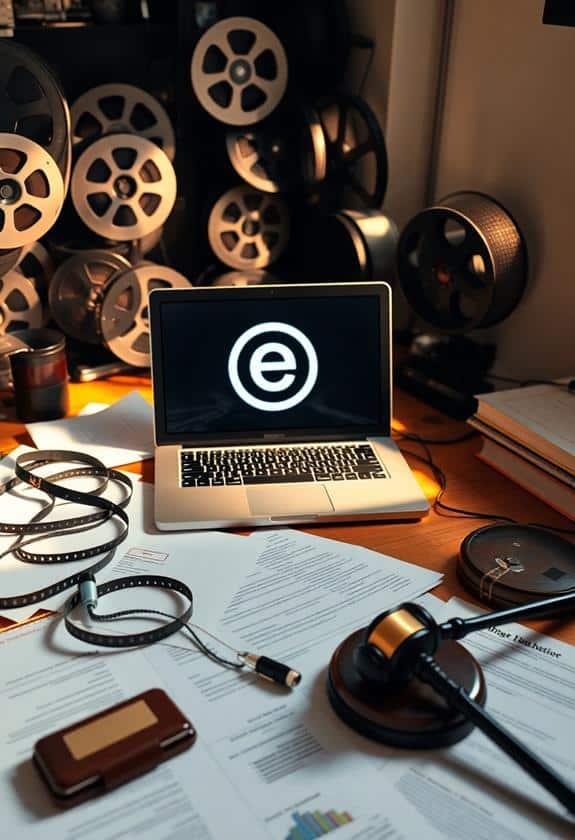
When diving into the world of filmmaking, understanding copyright fundamentals is essential. You might think copyright is just a bunch of legal mumbo jumbo, but it’s actually your best friend! It protects your creative work, so no one can swoop in and claim it as their own. Imagine spending hours crafting a brilliant script, only to find someone else has snatched it up and is passing it off as theirs. Yikes! Additionally, using quality filmmaking equipment, such as essential filmmaking equipment, can enhance your production value and help guarantee that your work is recognized and respected. Copyright covers a lot of ground, including your original films, scripts, music, and even characters. When you create something, it’s automatically protected, but there are steps you can take to strengthen your claim. Registering your work with the U.S. Copyright Office is a smart move; it gives you more power if someone decides to mess with your creations.
Understanding Licenses
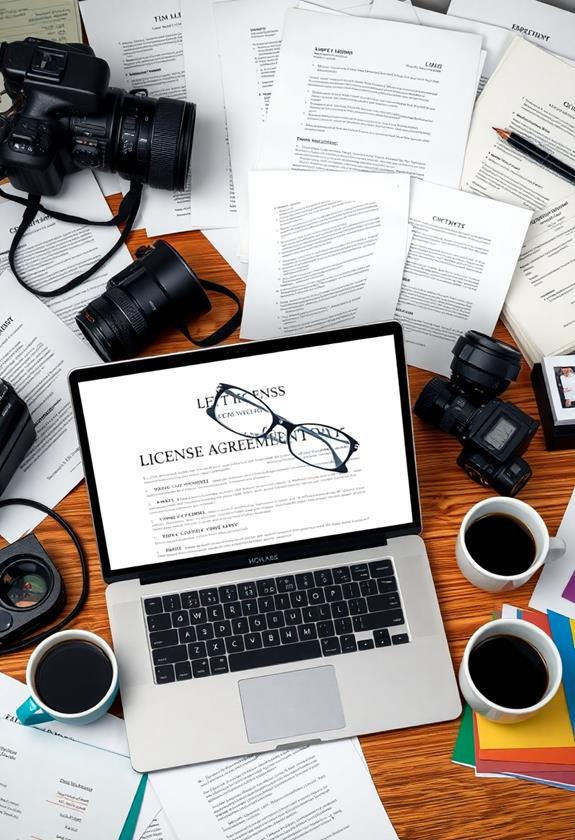
Copyright protects your creative works, but understanding licenses is equally important for filmmakers. When you create a film, it’s not just about your vision; it’s also about how you share and protect it. Licenses are like permission slips that tell others how they can use your work.
Here’s a quick breakdown of some common licenses you might encounter:
| License Type | Purpose | Example |
|---|---|---|
| Exclusive License | Grants one party exclusive rights | A distributor can sell your film only |
| Non-exclusive License | Allows multiple parties to use the work | Multiple streaming services showing your film |
| Creative Commons | Lets you share your work freely, with some restrictions | You can allow others to remix your film as long as they credit you |
When you understand licenses, you can protect yourself and your creations. I once had a friend who didn’t bother with licensing, and it led to a lot of confusion and frustration. Don’t let that happen to you! Knowing how to use licenses wisely helps keep your filmmaking journey safe and enjoyable.
Contract Essentials
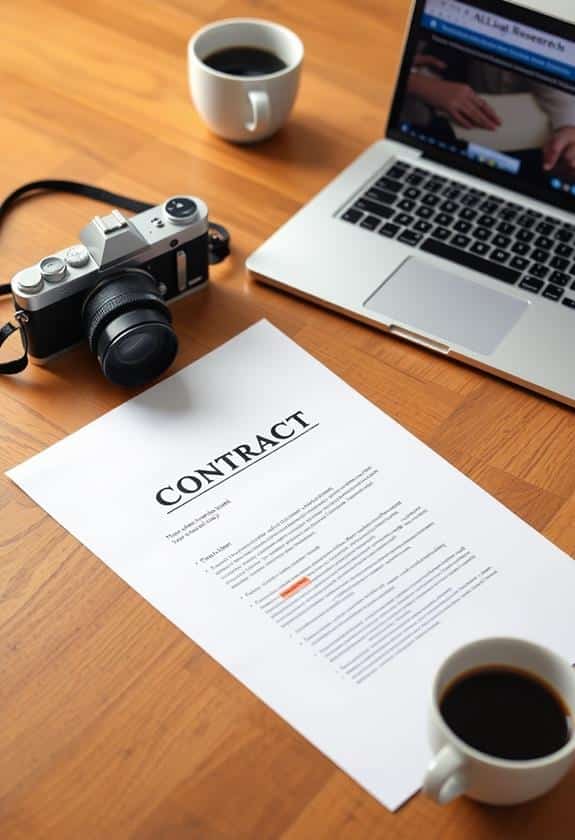
Contracts are the backbone of any successful filmmaking project. They guarantee everyone’s on the same page, protecting your hard work and creativity. Imagine you’ve poured your heart into a film, only to find out later that someone didn’t follow through on their promises. Yikes! To avoid that nightmare, always get things in writing. Having the right equipment can also bolster your project’s quality, as a good camera can make a significant difference in your final product—discover the best cameras for filmmaking enthusiasts.
Start with a clear agreement outlining each person’s responsibilities. This includes crew members, equipment rentals, and locations. If you’re hiring a cinematographer, specify what they’ll deliver and when. A well-written contract can save you from misunderstandings and potential disputes.
Don’t forget to include payment terms. Who doesn’t want to know when they’ll get paid? Also, make sure to address what happens if someone doesn’t pull their weight. Having a plan for those “what if” moments keeps the peace and helps you focus on your art.
Lastly, while it’s tempting to skip the legalese, consider consulting a lawyer. It might feel intimidating, but it’s a small investment for peace of mind. Remember, contracts are your safety net, allowing you to create without fear. So, embrace them, and let your creativity shine!
Talent Releases

Before you start filming, securing talent releases is crucial. It might sound boring, but trust me, it’s the backbone of a smooth production. A talent release is a legal document that gives you permission to use an actor’s likeness, voice, and performance in your project. Without it, you could find yourself in hot water later on—imagine an actor demanding you remove their face from your film! In addition to protecting your project, having those releases allows you to focus on your essential gear for professional movie-making without worrying about legal issues.
When you’re on set, hand out those releases like candy. It not only protects you but also makes your actors feel valued. They’ll appreciate your professionalism. Simply explain that the release guarantees they’re cool with you using their performance in any way you see fit.
You can even make it a fun moment! Maybe snap a goofy selfie with them after they sign. Just remember, if you’re filming minors, you’ll need a parent or guardian’s signature too.
In the end, talent releases aren’t just paperwork; they’re a way to build trust with your team. So, take a deep breath, grab those signatures, and get ready to create something amazing! Your future self will thank you.
Location Agreements
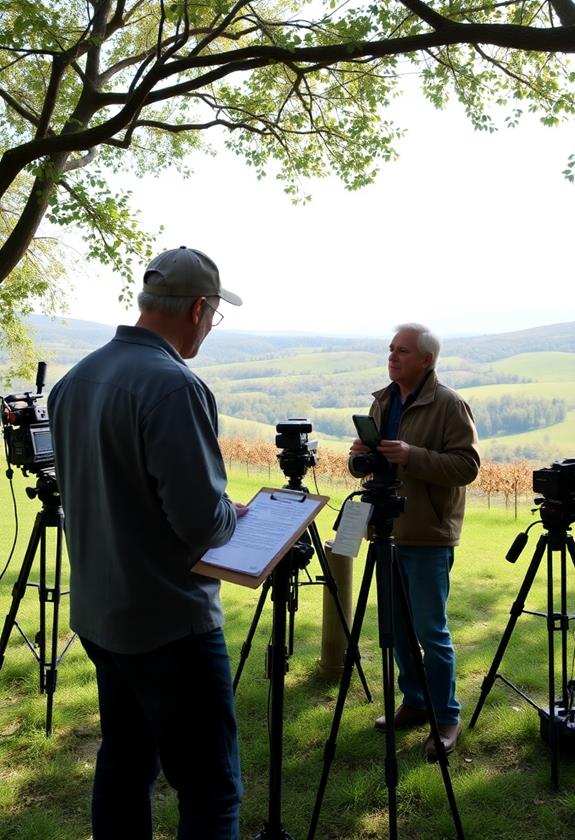
Securing the right locations for your film is just as important as getting those talent releases. Trust me, I’ve learned the hard way! Imagine showing up to a beautiful spot, only to find out you don’t have permission to film there. Yikes! That’s why location agreements are essential for every filmmaker. Additionally, having the right gear can enhance your filming experience, so consider investing in affordable filmmaking equipment to make the most of your chosen locations.
Here are four key things to remember when drafting your location agreement:
- Get it in Writing: Always have a signed document that outlines your rights to film on the property. Verbal agreements can lead to misunderstandings.
- Define the Terms: Clearly state when you’ll be filming, how long you’ll need the space, and what areas are off-limits.
- Address Liability: Make sure you’re covered in case of accidents or damages. This protects both you and the property owner.
- Respect the Space: Leave the location as you found it. A little respect goes a long way and helps build good relationships for future projects.
Distribution Rights
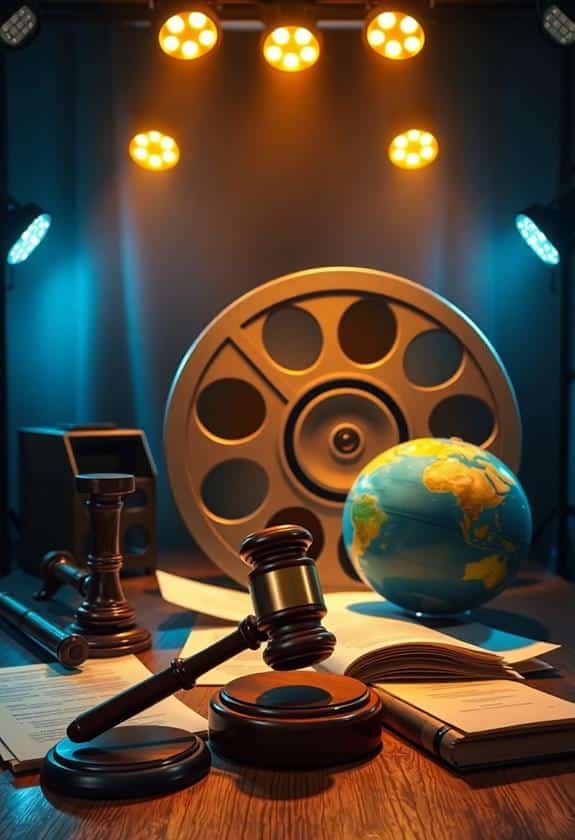
When it comes to getting your film into the world, understanding distribution rights is essential for your success. It’s not just about making a great movie; it’s about knowing how and where it can be shown. Distribution rights determine who can sell, stream, or showcase your film. You want to make sure you’re protected and that you’re getting what you deserve for your hard work.
Here’s a simple table to help you visualize what you need to keep in mind:
| Type of Distribution Right | What It Means |
|---|---|
| Theatrical Distribution | Rights to show your film in cinemas. |
| Digital Distribution | Rights for online streaming or downloads. |
| International Distribution | Rights to sell your film abroad. |
| Merchandise Rights | Rights to sell related products. |
When I first started, I overlooked these rights, and it was a headache later on. Understanding them early can save you time, money, and stress. So, take a breath and immerse yourself in this important part of filmmaking. You’ve got this!
Fair Use Explained
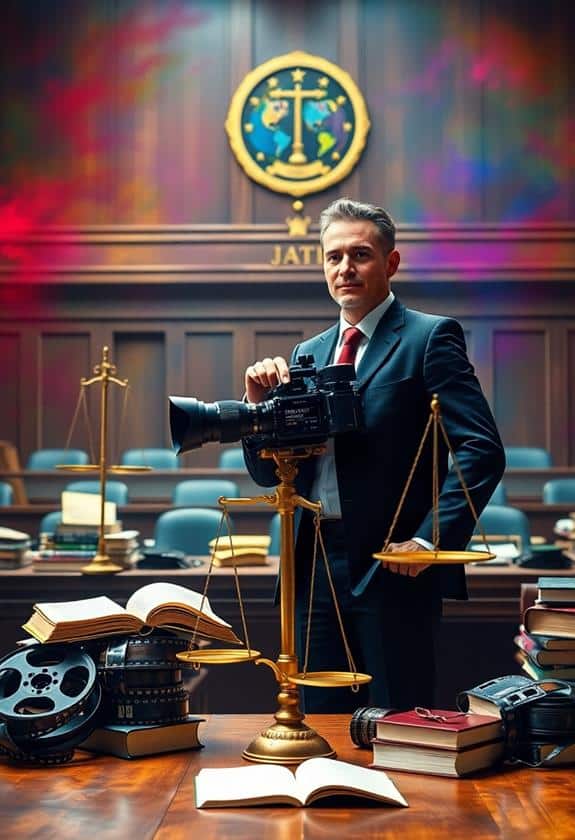
Understanding fair use is essential for filmmakers, as it can greatly affect how you use existing content in your projects. Fair use allows you to borrow elements from other works without permission, but it’s not a free pass. You’ve got to know the rules to stay safe and out of legal trouble. Additionally, ensuring that your audio quality is exceptional can enhance your project, as clear audio enhances viewer engagement. Here are four key factors to take into account when evaluating fair use:
- Purpose and Character: Is your use for commercial purposes, or is it educational or transformative? The latter usually leans more toward fair use.
- Nature of the Work: Using factual content is more likely to be acceptable than using creative works.
- Amount Used: The less you use, the better. A short clip is safer than a lengthy scene.
- Market Effect: If your use could harm the original work’s market, you might be crossing the line.
Insurance Considerations
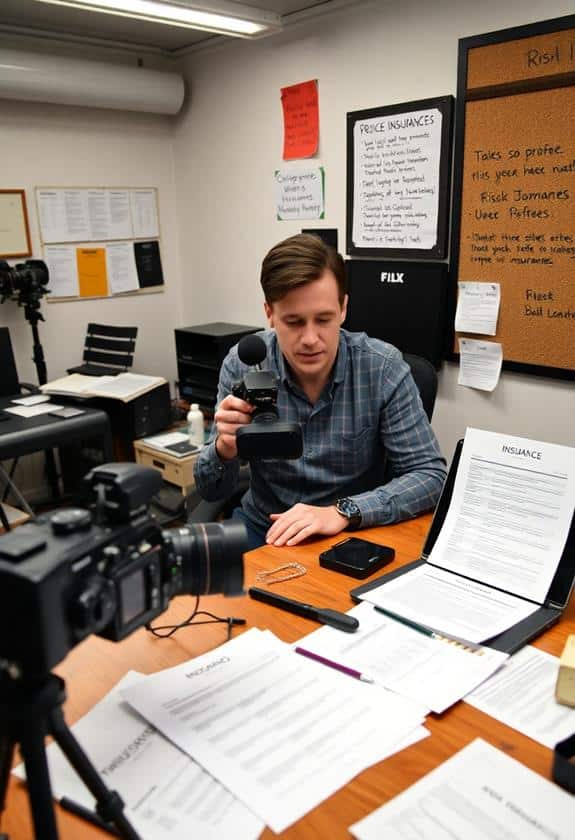
You’ll want to contemplate different types of coverage, like general liability insurance, which protects you against accidents that might happen on set. This way, if someone trips and spills their drink on your favorite camera, you’re covered. You might also reflect on production insurance, which can cover everything from equipment theft to weather-related delays. Trust me; it’s a lifesaver!
When I started, I didn’t see the value in insurance, but after a few close calls, I changed my tune. One time, a sudden rainstorm ruined a significant outdoor shoot. Luckily, my insurance had my back, and I didn’t lose a fortune! So, before you plunge into your next project, think about safeguarding your hard work. Insurance might seem like a hassle, but it’s a smart investment in your creative journey!
Trademarks in Film
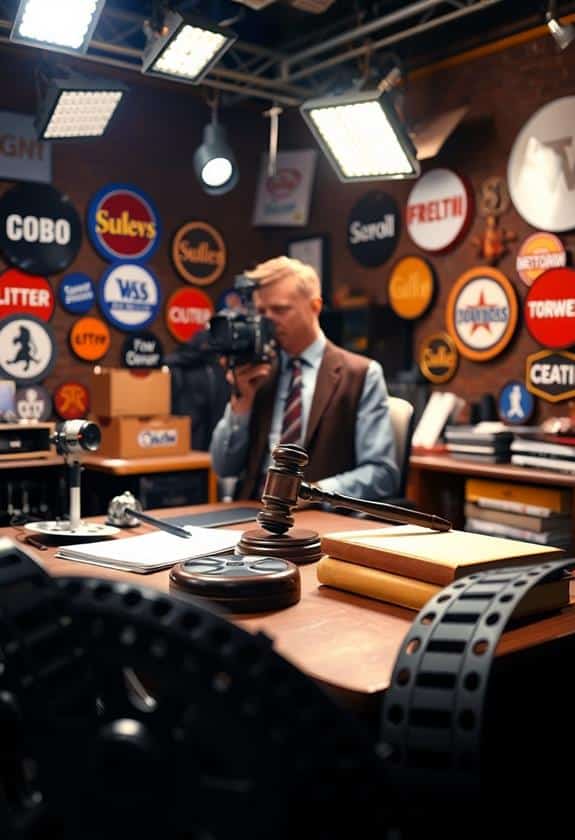
Trademarks play an important role in the film industry, helping to protect brand identities and guaranteeing that audiences recognize the products, services, or even characters associated with a film. As a filmmaker, it’s crucial to understand how trademarks work so you can avoid potential legal pitfalls. Here’s what you should know:
- Identify Trademarks: Be aware of trademarks in your script. Avoid using existing brand names unless you have permission, as it could lead to legal trouble.
- Create Original Brands: If your film involves fictional products, invest time in creating unique brand names and logos. This adds authenticity and keeps you safe from trademark issues.
- Seek Permission: If you want to showcase real brands, don’t hesitate to reach out for permission. It’s a great way to build relationships with brands and guarantees you’re legally covered.
- Use Fair Use Wisely: Sometimes, you can use trademarks under fair use, but this can be tricky. Make sure you understand the limits to avoid any surprises later on.
International Regulations

Filmmakers often encounter various international regulations that can greatly impact their projects. When you decide to shoot in another country, it’s essential to understand their rules. Trust me, I learned this the hard way! On my first international shoot, we faced unexpected customs regulations that delayed our equipment for days. It taught me the importance of research!
Different countries have unique laws regarding permits, labor, and even what you can film. For instance, some places require a special permit for aerial shots, while others have strict guidelines about child actors. You wouldn’t want to find yourself in hot water over something you overlooked, right?
Also, consider copyright laws. Just because a film’s location looks amazing doesn’t mean it’s free to use. Sometimes, you might need to pay fees or obtain permissions to avoid legal troubles.
And remember, cultural sensitivity matters! Understanding local customs can save you from unintentional blunders. It’s like maneuvering through a minefield, but with the right prep, you can create art while staying safe. So, always do your homework, and don’t hesitate to consult a legal expert when needed. Happy filming!
Frequently Asked Questions
What Are the Common Legal Pitfalls in Independent Filmmaking?
When you plunge into independent filmmaking, you’ve gotta watch out for common legal pitfalls. Not getting proper release forms from actors can lead to trouble later. You might also overlook copyright issues with music or scripts, which could bite you. I’ve learned the hard way that securing location permits is essential too! So, always double-check your contracts and rights. It’s better to be safe than sorry when you’re bringing your vision to life!
How Can I Protect My Film Idea From Being Stolen?
Think of your film idea like a secret recipe; you want to keep it safe! To protect it, start by writing a detailed outline and mark it as your own work. Share it with trusted friends or mentors, but ask them to sign a non-disclosure agreement first. You can also consider copyrighting your script. Remember, staying open about your passion doesn’t mean you have to let everyone taste your secret sauce!
What Are the Penalties for Copyright Infringement in Filmmaking?
If you infringe on copyright while filmmaking, you might face serious penalties. You could end up paying hefty fines or even losing your project. In extreme cases, you might have to stop showing your film altogether. I remember a friend who faced a lawsuit for using a song without permission—yikes! So, always get the rights you need, and it’ll save you a lot of headaches down the road. Better safe than sorry, right?
Do I Need a Lawyer for My Film Project?
You definitely should consider getting a lawyer for your film project. They can help you navigate tricky contracts, copyright issues, and other legal stuff that might pop up. Trust me, it’s like having a safety net while you’re balancing on a tightrope! I learned the hard way when a friend’s film got tangled in legal knots. So, don’t skip this step; it’s worth it for your peace of mind and creative freedom.
How Do I Navigate Film Regulations in Different Countries?
Steering through film regulations in different countries is like trying to solve a puzzle with missing pieces. You’ll want to research each country’s rules, just like checking a recipe before cooking. Connect with local filmmakers or legal experts for guidance; they can offer invaluable insights. Don’t forget to secure permits and understand copyright laws, as they vary widely. It might seem intimidating, but with preparation, you’ll find your way through smoothly!
Conclusion
So, as you immerse yourself in the world of filmmaking, remember that understanding the legal side isn’t just a chore—it’s your safety net. Think of it as the friendly bouncer at the door of your creative club, keeping out unwelcome guests. By knowing copyrights, contracts, and licenses, you’re not just protecting your art; you’re paving the way for future stories. Embrace these essentials, and you’ll navigate your filmmaking journey with confidence, leaving you free to focus on what you love—telling stories!




